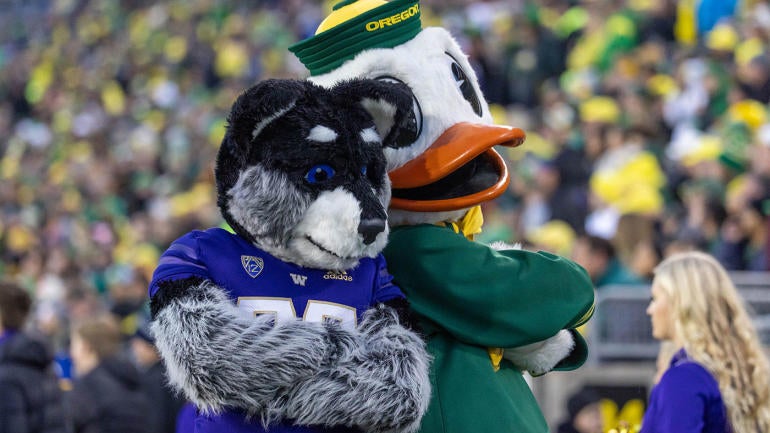
Oregon and Washington have joined the Big Ten, the universities and conference announced Friday night. The programs become the third and fourth Pac-12 members to leave the conference for the Big Ten in the last 13 months.
"Accepting membership into the Big Ten Conference is a transformational opportunity for the University of Oregon to change the short and long-term trajectory of our university and athletics department," said Oregon athletic director Rob Mullens. "The stability and exposure of joining the Big Ten is of great benefit to the University of Oregon, and we are grateful to the Big Ten presidents and chancellors for accepting our application to join the conference. We look forward to the opportunity for our student-athletes to compete in this conference, which includes many of the best programs in the nation in every sport."
"We have tremendous respect and gratitude for the Pac-12, its treasured history and traditions. At the same time, the college athletics landscape has changed dramatically in recent years," said Washington AD Jennifer Cohen. "The Big Ten's history of athletic and academic success and long-term stability best positions our teams for future success, and we are energized at the opportunity to compete at the highest level against some of the best programs in the country."
The programs, both charter members of the Pac-12 dating back to 1915, informed Pac-12 presidents earlier Friday that they planned to accept invitations from the Big Ten. The Big Ten made those formal offers later Friday with both Oregon and Washington officially approving the measures.
Oregon and Washington are the third and fourth Pac-12 schools to join the Big Ten ahead of the 2024-25 season with USC and UCLA previously announcing their planned departures last summer. At that point, the Big Ten will stand as an 18-team conference, the largest in college football history.
Five schools have now left the Pac-12 in the last 13 months as Colorado last week moved to the Big 12. Arizona is a Board of Regents approval away from joining the Big 12. Arizona State has formally applied for membership, sources tell CBS Sports' Dennis Dodd, and Utah has done the same, according to ESPN.
Momentum appeared headed in the direction of the Oregon and Washington departing for the Big Ten over the last couple of days, though a last-ditch effort was made Friday morning by the Pac-12 to keep the programs in the league, sources told Dodd. That made their futures a "coin toss" for a while, largely due to financial concerns over additional travel costs the programs would incur by journeying to Big Ten locations. Washington in particular was concerned those increased financial obligations could total more than $10 million per year for the university, sources said.
Both Oregon and Washington stated their commitments to continuing their in-state rivalries with Pac-12 members Oregon State and Washington State, respectively.
Oregon and Washington will receive 50% shares of Big Ten media rights revenue to the tune of $30 million in 2024 with annual $1 million escalators until the completion of its new deal with CBS, Fox and NBC, according to ESPN and The Inside Zone's Matt Fortuna. Other Big Ten programs, including USC and UCLA, will receive $60 million or more annually. An Oregon official said Friday that the Ducks and Huskies would be in line for full shares once the next contract is signed well into the future.
If Oregon and Washington do incur additional travel expenses of up to $10 million each, that would eat into a significant chunk of their payouts, putting their net revenue around $20 million annually. That is essentially the same number presented earlier this week when Pac-12 commissioner George Kliavkoff divulged the streaming-centric Apple agreement to his league members.
Still, the platform of the Big Ten -- which holds those three separate linear television agreements -- and the lacking stability of the Pac-12 likely made the moves no-brainers for the universities.
What will happen to the Pac-12?
Pac-12 presidents met Friday morning. There was a grant of rights contract presented to the universities in hopes of securing a new media deal that could keep the conference together in some form, though nothing was signed, according to multiple reports.
That session came on the heels of an Arizona Board of Regents meeting held Thursday before which Arizona was in deep discussions about following Colorado to the Big 12, sources told CBS Sports.
The Apple media rights package presented to Pac-12 members this week reportedly includes tiers of incentives with a significant upside for teams if certain different levels of subscription numbers are met.
Pac-12 financial projections emerging from the meeting are believed to start around $20 million per school annually. By contrast, full-share Big Ten schools will receive around $60 million from CBS, Fox and NBC, while Big 12 schools are set to obtain nearly $32 million annually through their new media rights agreement with ESPN and Fox.
The Big 12 also remains in pursuit of Arizona State and Utah out of the Pac-12.
There is substantial sentiment within the Arizona and Arizona State athletic departments that a conference sever between the programs is both undesired and unlikely, sources told CBS Sports' Matt Norlander on Thursday night. The Wildcats leaving Sun Devils behind in the Pac-12 "would be extremely surprising," one high-ranking source said.
Big 12 commissioner Brett Yormark has long preferred to expand to 14 teams but was willing to move to 16 teams as the league had secured pro rata (equal value) shares so long as it adds Power Five programs to the conference.
Should the Big 12 be unable to acquire Arizona (its primary target), Arizona State and/or Utah, the conference may turn its focus to UConn as a top Group of Five option due to its stellar basketball program, sources previously told CBS Sports.
Should Arizona, Arizona State and Utah all depart for the Big 12, the Pac-12 would be on its last legs with California, Stanford, Oregon State and Washington State the only remaining members. At that point, a merger of sorts with the Mountain West -- for two or perhaps all four programs -- and/or potential independence would likely be the only remaining options.





















